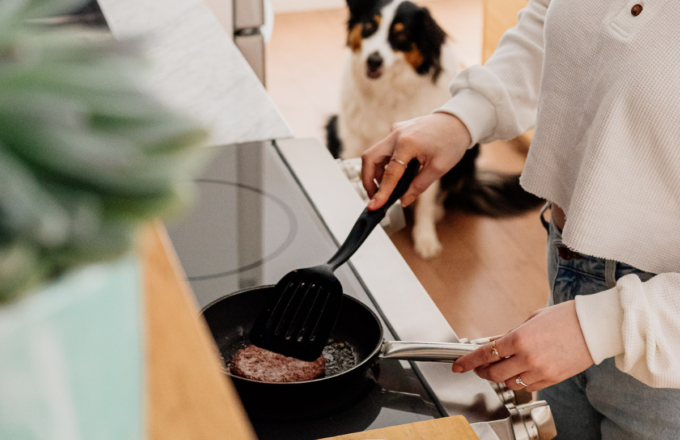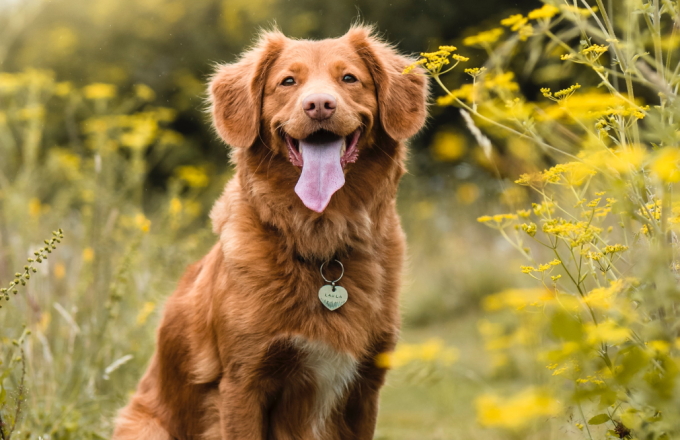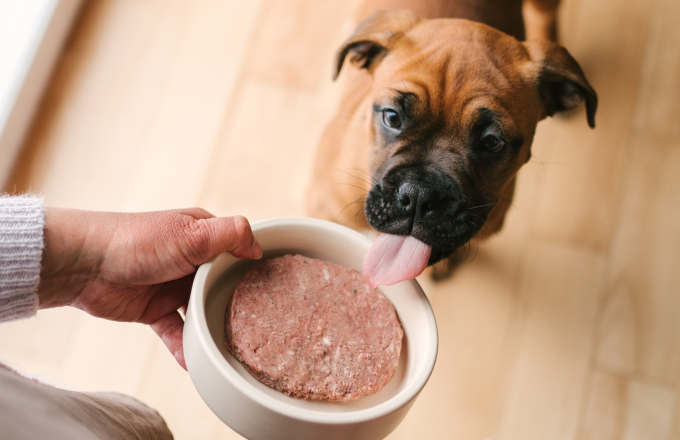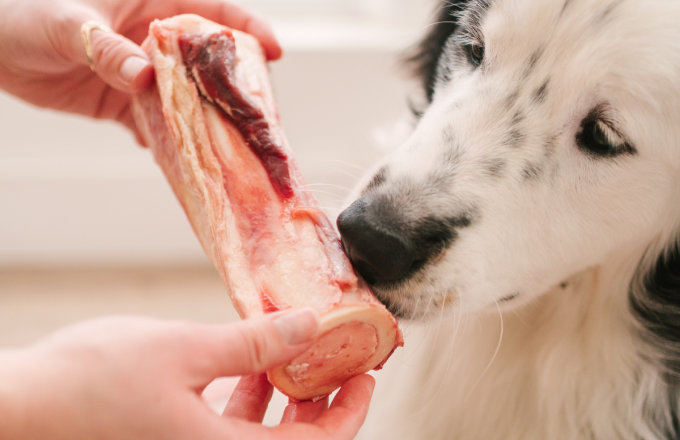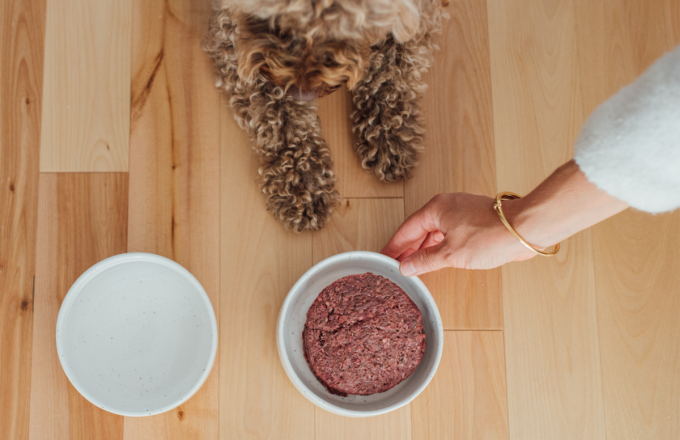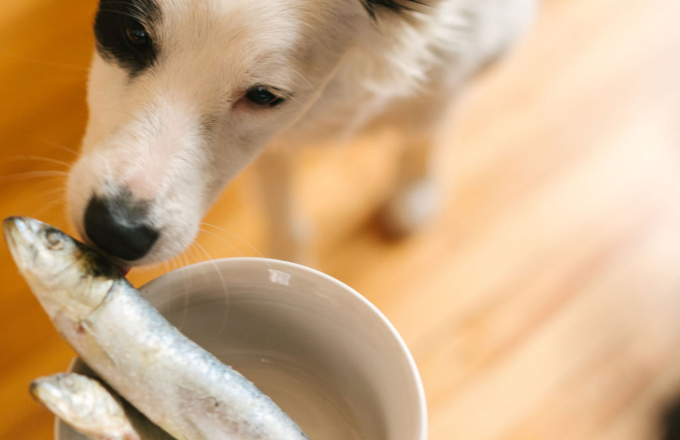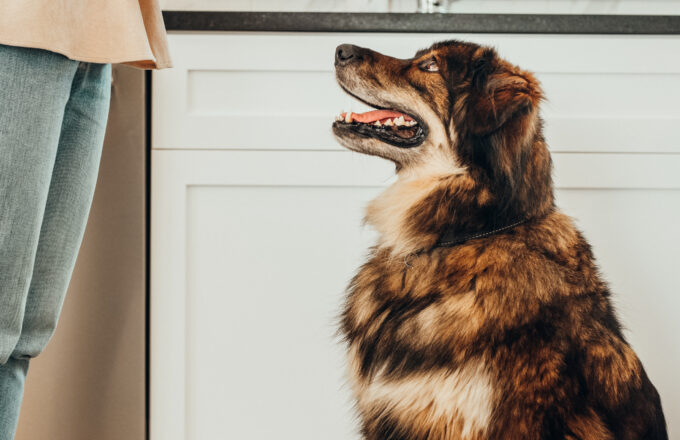Dry skin in dogs: causes, symptoms & treatments
Have you noticed your dog scratching frantically, rubbing their snout, or licking their paws? Several factors are likely at play, starting with the change in seasons and the cold weather. These could also signal towards more serious skin problems. We’ll cover the symptoms, causes, and possible treatments for dry skin in dogs.
How to recognize dry skin in dogs
While dry skin is uncomfortable for all dogs, they may not all experience the same symptoms. See the complete list of symptoms below:
- Itching
- Dandruff
- Pimples
- Hair loss
- Inflammation
- Unpleasant or unusual odor
- Oily skin
- Scabs
- Coarse and brittle hair
- Damaged or cracked skin
What causes dry skin
Dogs and humans have similar skin. Just like us, your canine companion’s skin has a hard time staying hydrated throughout the winter. This can often be attributed to the change in seasons and temperatures, but other factors can be responsible for skin problems.
Food
Did you know that dry skin can indicate a nutritional deficiency? Your dog’s diet may be inadequate or lacking the fatty acids needed to keep their skin healthy. Raw food contains fatty acids, optimal hydration, and the essential nutrients that contribute to a healthy skin and coat.
Allergies
Besides the change in temperatures, allergies are a major cause of dry skin in dogs. There are three types of allergies: seasonal (pollen), topical (mold, dust, etc.) and food-related. Most of these allergies should be checked with a veterinarian. Don’t hesitate to make an appointment with them.
For food allergies, the solution is often to change your pet’s diet to rule out allergens. Raw food is an ally in this type of case.
CHECK OUT OUR HYPOALLERGENIC RECIPE
Hygiene
While it’s important to wash your dog, too many baths will dry out their skin. Reduce the frequency—wait 4 to 6 weeks between each bath, and use natural, gentle products.
Parasites
Dry, scaly skin with dandruff may point to parasites, which can cause scabs. This includes the Demodex mite and fleas during the summer. However, just because it’s snowing outside doesn’t mean you should rule out parasites. A visit to the vet is necessary to diagnose whether parasites are causing your dog’s dry skin, as this can also result in seborrheic dermatitis or ringworms.
Infections
It’s possible that your dog will develop skin problems caused by a bacterial or fungal infection. This usually thrives in moist environments such as the armpits, ears, and paws. It’s usually diagnosed by a vet using cytology. Dry skin may be a sign that a bigger problem is affecting your pet. The infection can just be a symptom of it.
Diseases
Sometimes dry skin is a signal of a more serious problem like Cushing’s disease or hypothyroidism. Both of these metabolic conditions can cause dry skin in canines. Abnormal hair loss may also be noticed. In rare cases, dry skin can be caused by autoimmune diseases.
Breed-specific skin conditions
Some breeds are more likely than others to have skin conditions such as dry skin. Chinese breeds and hairless dogs are more vulnerable to skin problems. Additionally, Siberian Huskies and Alaskan Malamutes whose skin is sensitive to zinc can develop dermatosis. If you suspect anything, don’t hesitate to make an appointment with a vet to find out.
6 ways to relieve your dog’s dry skin
It’s important to speak with a veterinarian to help determine the cause of dry skin. However, these tips can help your dog stay hydrated.
Good hydratation
The key to healthy skin and a beautiful coat is hydration. The more hydrated your dog, the healthier the skin. Make sure your pet always has access to a bowl of fresh water. This will rehydrate their internal tissues and skin.
You can also add liquids to their diet, like chicken broth, or opt for raw food, which offers better hydration than a dry diet.
Another way to hydrate your pet’s skin is by skin stimulation. Petting your dog stimulates the dermis of their skin and thus promotes the production of their natural fat layer. It also strengthens your bond with your dog!
Apple cider vinegar
Organic, raw, unfiltered apple cider vinegar offers many benefits for dogs with allergies. You’ll find this ingredient in all Faim Museau recipes.
If your dog has hot spots or itchy skin, you can also apply a mixture of apple cider vinegar and water using a spray bottle.
Adequate humidity
Dry air is often one of the problems encountered in winter. You cannot control the temperature outside, but you can control the temperature inside your house. Use a small humidifier to control the humidity in the rooms.
Remember that your dog has a fur coat and you like overheating your house, but it doesn’t help your dog’s skin. Lower your heating a few degrees… and put on slippers. 😉
Fatty acids
Adding healthy fats to your dog’s diet shouldn’t be overlooked. Getting the right balance of omega-3s and omega-6s will help reduce the inflammation that itchy rashes can cause, as well as hair loss and dandruff.
All of our recipes contain foods rich in omega-3 fatty acids such as cod liver oil. If you prefer keeping your dog’s current diet, consider adding fresh sardines to their meal.
Brushing
Daily brushing should always be part of your routine, especially during the changing seasons. This helps reduce hair loss and removes dander and bacteria from the surface of the skin.
A simple brush or a comb are preferred. Bristle brushes should not be used more than once or twice a week so as not to remove healthy fur and irritate the skin.
Topical moisturizers
Sometimes your dog will need targeted treatment for a condition. Topical moisturizers can help reduce the itchiness and prevent your dog from licking and scratching on hot spots.
Coconut oil and apple cider vinegar can also help. However, don’t overdo it with topical moisturizers, they are rarely a complete, long-term solution. This is really to reduce irritation and help heal an injury. It doesn’t kill the root of the problem.
Dry skin can be the result of several causes. This is why it’s important to see a veterinarian to rule out any serious problems. Make sure to keep your dog’s skin hydrated at all times and to provide them with a fresh, complete, and balanced nutrition.



